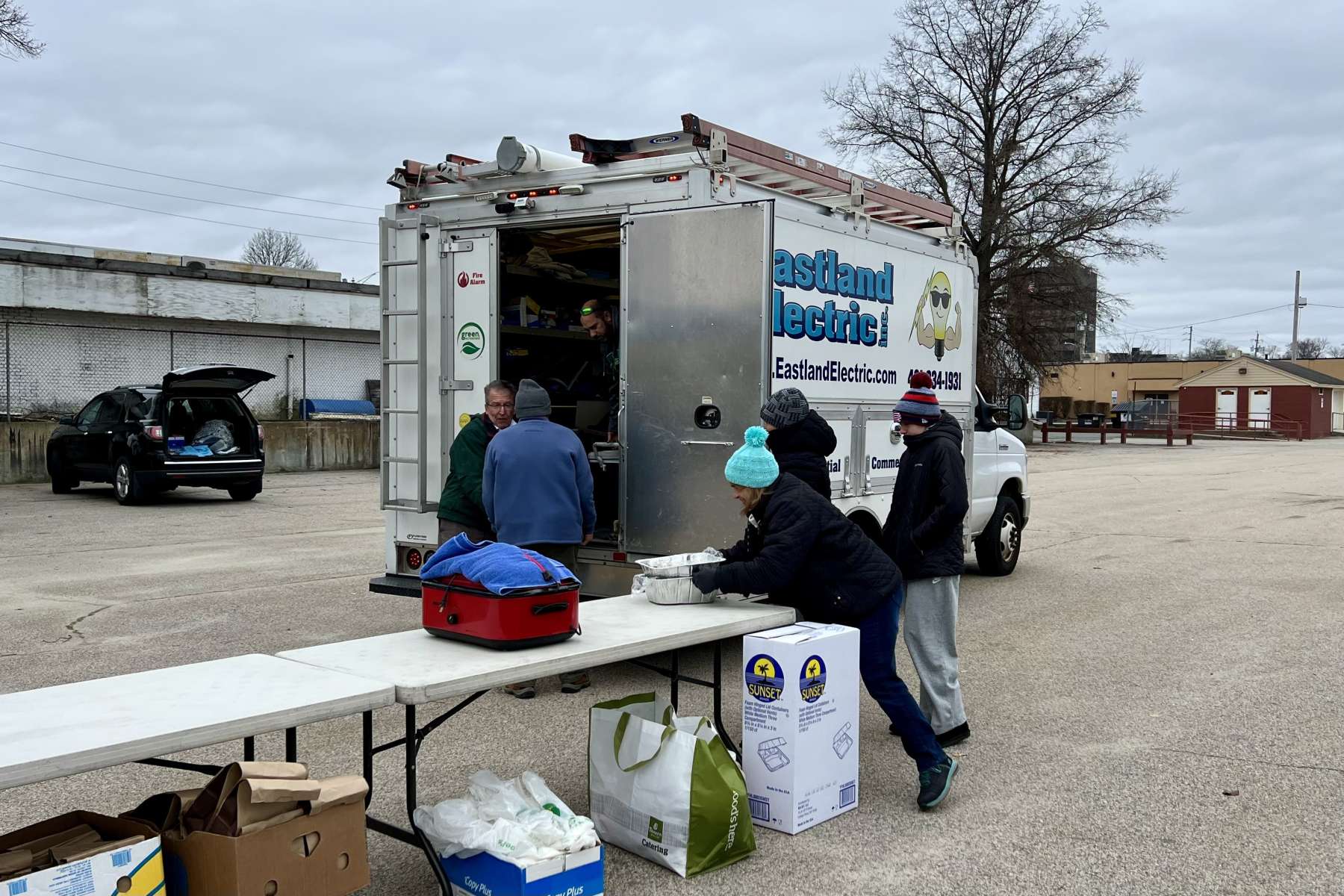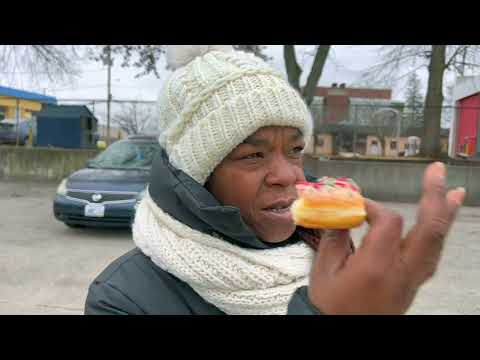As freezing temps take hold, hundreds remain homeless in Rhode Island
Over 385 people suffered outdoors in Rhode Island last night as temperatures dropped into the low twenties. In Woonsocket on Sunday, no matter the weather, volunteers set up to deliver around 150 meals to those who are unhoused or in poverty.
December 12, 2022, 11:33 am
By Steve Ahlquist
Early Sunday morning temperatures dipped into the low 20s in Woonsocket and as we pulled into the parking lot of Bouley Field the temperature was still under 32 degrees. Here, every Sunday, the MAE Organization and the Community Care Alliance work to provide services and meals to those struggling, including those who are homeless and in shelters, as well as those who are homeless and living in tents or other outside places.
One of the Mae Organization’s volunteers, Norm, told us that they serve about 150 meals out here every week. We see people in line with children, getting gloves and underwear from Marie, Norm’s spouse.
We do not take any photos, because most people here do not want to be photographed, and families dealing with homelessness are often fearful that DCYF will take their children if they are unable to provide reliable shelter or are “sleeping rough.”
“Basically, you know, we’ve been out here for a year,” said Adam. “We tried everything to get resources, stuff like that. I don’t think it’s a drug problem out here. I think it’s the housing problem.”
Adam and his partner Brianna (not their real names) are living in a tent in Woonsocket. Adam has a full time job working nights as a chef. Even if there were a shelter bed available for couples, Adam wouldn’t be able to use it, because his job requires him to work until around midnight, and the shelters have a strict “in by seven, out by seven policy.”
“If more people get more help, maybe people won’t turn to drugs so much, you know what I mean?” said Adam. “I personally think now that it’s cold out, there should be a lot more resources handed out here. There’s a lot of vacant buildings that could be bought to put the people up in.”
That isn’t happening. And even if that were an option, it will take time to get the buildings in order and to hire the people to provide the services many unhoused people need to survive. In the meantime, people are suffering in sub-freezing temperatures right now.
“How many people do you know out here, sleeping in tents?” asks Uprise RI.
“More than ten,” replies Adam, at least in the area around the tent he shares with Brianna. He looks around. “Most, of the people here, I would say 60% are.”
“Some of them are lucky to be in a shelter,” said Brianna. “Because they only do a men’s shelter, right? From November 1st till April 1st. The rest of the year the men are out living in tents.”
There are no shelters for women or couples in Woonsocket.
“It’s really hard when you’re working and you still can’t get in somewhere because everything is too high priced,” said Adam. “You don’t have a stable place or a stable number to get in touch with these people. It’s hard to get around when you don’t have a vehicle. There’s a lot of challenges, but a little bit more help goes a long way.”
Adam got locked up for a few days because he had warrants that needed to be cleared up. For that time Brianna, who walks with the assistance of a cane, was alone.
“The cops tried to kick me off where I was at, but I knew it was private properties so I made the cops get the owner and I made an arrangement with the owner where we could stay there as long as we kept it clean,” said Brianna.
Every time the police see Adam, they pull over and run his name. Adam feels harassed, and the cops all know who he is. But they still stop him on the street and run his name for warrants.
While away from their tent, or even at night while sleeping, Adam and Brianna have had their stuff vandalized, their tent slashed, and their property stolen.
“Robbing your blankets, stealing whatever they can get. Setting fires,” said Brianna. Brianna and Adam have been homeless over two years. For a short time a friend put them up in a hotel, but since then they’ve been in a tent.
Travel is difficult. This meal in the parking lot of Bouley Field is the only free meal on offer today. It’s important to make the trip to be here. The schedule is that Monday through Thursday they do a lunch at New Beginnings out of Saint James Church. Safe Haven and Serenity offer something like a lunch, but it’s really just snacks, like chips.
“But on Friday, there’s nothing,” said Brianna. “On Saturday the Loaves and Fishes food truck come out, and the Spanish church sometimes serves food.”
But here, now on Sunday, this is the only place serving food.
Two men approach the food line towards the end of the lunch.
“What is it, by the way?” asks one of the men, accepting the bagged hot lunch.
“It’s shredded chicken,” said a volunteer, handing him and his friend each a bag. “Roasted potatoes and a nice green salad. Then your lunch is peanut butter and a sweet and a savory, like potato chips, and a bottle of water.”
“Wow. Very nice. Cool. You sound like a waitress. I like that,” said the man. “My mom was a waitress. Me and my dad used to own a restaurant, actually.”
He and his friend live in a shelter. Today, because there is snow forecast to start in a few hours, the shelter is opening at 2pm, so they will have a warm place to weather the storm, but on Monday morning at 7am, while many of us are scraping snow off our cars, they will be outside.
“People just have no idea what it’s like to live out here,” said Christa Thomas-Sowers, executive director of the Community Care Alliance. “You might go run an errand and come back to your tent and all of your worldly possessions have been stolen or thrown in the trash. And then you have to start over from scratch again. How discouraging is that, especially when people reach out for help and are not given any? How many times do they have to try to access help before there’s actually help received?”
And help is harder and harder to get. The most recent numbers show that 385 people in Rhode Island, including families with children, are sleeping outside, and experts stress that the number is an undercount. Governor Daniel McKee denies these numbers, though he hasn’t offered any evidence for doubt or any suggestions as to what the number might actually be.
Bill was sleeping outside when he had a job working at Walmart.
“I was taking a nap the Friday before Thanksgiving. Somebody hit me over the back of my head. Stole my backpack. My cell phone. All my medications. My work radio,” said Bill. “The store manager told me to take a leave of absence.”
Now, unemployed and homeless, Bill has been sleeping at the Salvation Army. He came to the Mae Organization for a hot meal. Bill knows many people who are sleeping outside, many are drug users.
The harassment is worse now because with the leaves gone, people can see the tents through the trees and either call law enforcement or simply harass and assault the people in tents themselves.
“On August 13th, 2009, I died,” said Bill. “I had a brain aneurysm. While they were repairing the aneurysm my heart stopped 10 times. Like a Timex, I take a licking and keep on ticking.
Two children are with their guardian, getting knit caps and gloves. All they have now are snow parkas and pockets. The children look excited to get the supplies, and Marie at Mae got them some underwear and some personal hygiene products as well. A kid on a bike, way under dressed for the cold gets a free donut.
“The landlord kicked me out a day after my uncle died,” said Isabelle Tolston, who agreed to be filmed. “I’ve been struggling with it. It is just a hard struggle and I hope I can get an apartment before my birthday, before the real snow come.”
Isabelle is in a hotel room now, but they don’t allow hotplates or any way to make her own food.
Before she got into the hotel room, courtesy of the Community Care Alliance, she was sleeping under some bleachers for three weeks.
“There’s a lot of people still out here,” said Isabelle. “A lot of them.”
No one knows why the police are so tough on the unhoused population in Woonsocket, but it’s been a problem for a while, said people to me who declined to be identified. Some feel that once and future Mayor Lisa Baldelli-Hunt is instructing the police to harass the homeless, and they fear that the recent actions by Governor Daniel McKee to evict a homeless encampment in front of the Rhode Island State House will embolden the elected leaders of cities and towns in the state to take a firmer, less compassionate hand in dealing with them.







